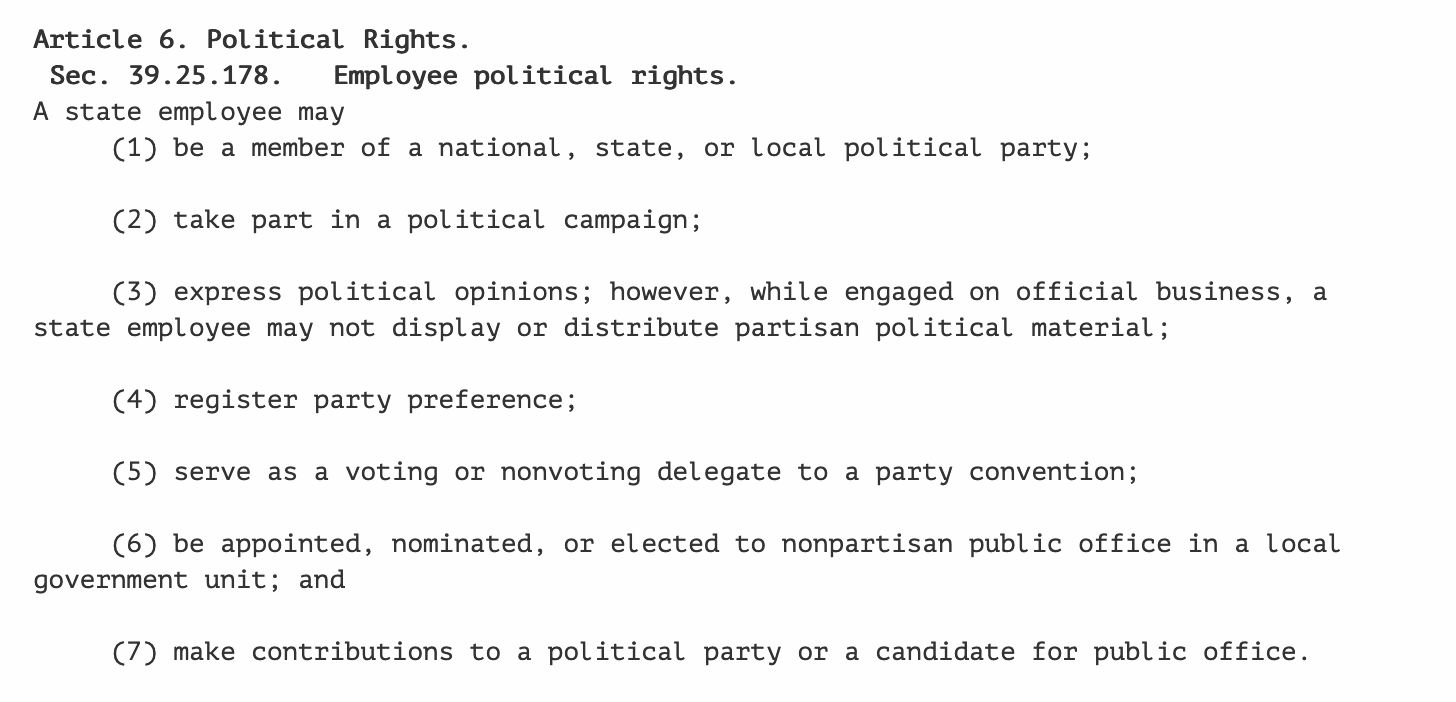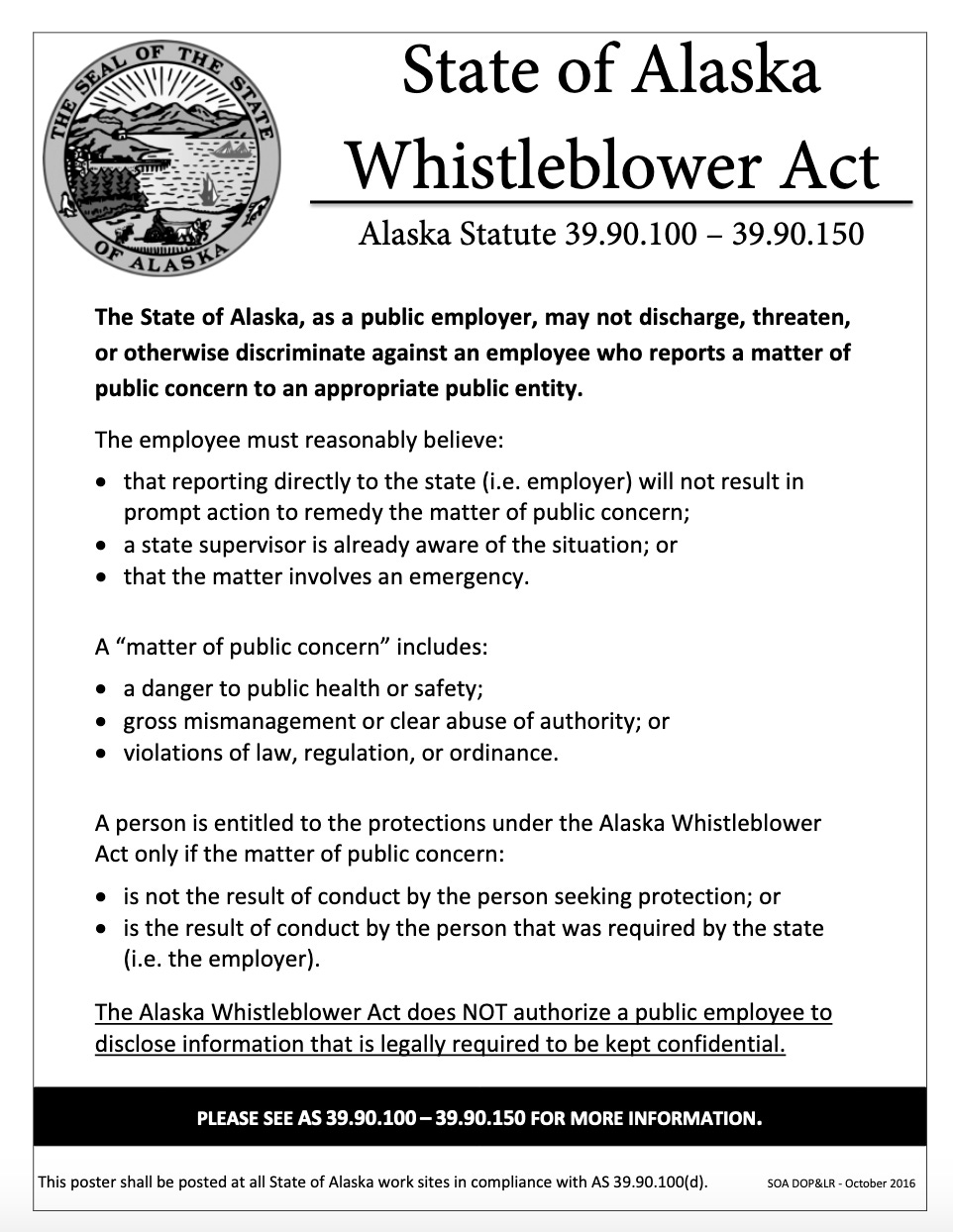This isn’t legal advice, but it is a repost from 2022. As you read this post and share the PX2+ post, please remember what Attorney General Treg Taylor recently said:
“Where there is uncertainty about an employee’s constitutional rights, the state should always defer to protecting those rights and seek clarity on the state’s role through the third branch of government . . . . As always, we are committed to upholding the law and will follow the court decisions,” said Taylor.
Public Employment Relations Act
The Public Employment Relations Act (PERA) grants you the right to organize or assist an organization for the purpose of collective bargaining. PERA also prohibits the State from engaging in “unfair labor practices,” which kill the organizing vibe.
AS 23.40.080. Rights of public employees.
Public employees may self-organize and form, join, or assist an organization to bargain collectively through representatives of their own choosing, and engage in concerted activities for the purpose of collective bargaining or other mutual aid or protection.
This is what we’re doing now. Concerted AF for mutual aid and protection, if nothing else. There’s a lot of protection here.
Sec. 23.40.110. Unfair labor practices.
(a) A public employer or an agent of a public employer may not
(1) interfere with, restrain, or coerce an employee in the exercise of the employee's rights guaranteed in AS 23.40.080;
(2) dominate or interfere with the formation, existence, or administration of an organization;
(3) discriminate in regard to hire or tenure of employment or a term or condition of employment to encourage or discourage membership in an organization;
(4) discharge or discriminate against an employee because the employee has signed or filed an affidavit, petition, or complaint or given testimony under [PERA]
Pretty self-explanatory, but note that remedies and penalties are a topic for a separate post.
First Amendment
Even though (1) the First Amendment right of association protects the right of individuals to come together over issues of mutual interest and (2) a union is an association of individual workers seeking to address common workplace issues, anti-trust laws pose problems for workers that choose to exercise this right, absent statutory protections such as PERA.
Still, you have the First Amendment right to be speak as a private citizen on a matter of public concern. Note that the same cannot be said for speech made as part of job duties.
Alaska, as an employer, was recently reminded of this area of the law.
speech-related cases require the application of a balancing test developed in Pickering to determine whether the employee's speech is constitutionally protected. Under the balancing test, the court must consider “the interests of the [employee], as a citizen, in commenting upon matters of public concern, and the interest of the State, as an employer, in promoting the efficiency of the public services it performs through its employees.” This balancing test is also applied in “hybrid speech/association” claims, where speech is inextricably linked with associational activity.
— Bakalar v. Dunleavy, 3:19-cv-00025-JWS, 14 (D. Alaska Jan. 20, 2022).
In case you were thinking “Balancing test? It can’t be that simple,” the trial court further explained:
The Ninth Circuit has synthesized Pickering and its progeny into a five-factor evaluation:
(1) whether the plaintiff spoke on a matter of public concern; (2) whether the plaintiff spoke as a private citizen or public employee; (3) whether the plaintiff's protected speech was a substantial or motivating factor in the adverse employment action; (4) whether the state had an adequate justification for treating the employee differently from other members of the general public; and (5) whether the state would have taken the adverse employment action even absent the protected speech.
The plaintiff bears the burden at the first three steps of the inquiry. The fourth step of the analysis represents the Pickering balancing test, and it is at this step where the burden shifts to the government employer to show that there were legitimate administrative interests involved that outweigh the employee's right to comment as a private citizen about matters of public concern.
— Bakalar, at 24.
The Bakalar case wouldn’t have happened if Alaska’s state public lawyers were organized. First and foremost, no one would have asked us to submit resignations at the 2018 change of the administration, or if they did, we could have answered with a hard
Continuing with the union/First Amendment theme, in Thornhill v. Alabama, 310 US 88 (1940), the Supreme Court overturned the conviction of a union president for picketing outside his employer. The Court observed
It is recognized now that satisfactory hours and wages and working conditions in industry and a bargaining position which makes these possible have an importance which is not less than the interests of those in the business or industry directly concerned. The health of the present generation and of those as yet unborn may depend on these matters, and the practices in a single factory may have economic repercussions upon a whole region and affect widespread systems of marketing. The merest glance at state and federal legislation on the subject demonstrates the force of the argument that labor relations are not matters of mere local or private concern. Free discussion concerning the conditions in industry and the causes of labor disputes appears to us indispensable to the effective and intelligent use of the processes of popular government to shape the destiny of modern industrial society. The issues raised by regulations, such as are challenged here, infringing upon the right of employees effectively to inform the public of the facts of a labor dispute, are part of this larger problem. We concur in the observation of Mr. Justice Brandeis, speaking for the Court in Senn's case (301 U.S. at 301 U. S. 478):
“Members of a union might, without special statutory authorization by a State, make known the facts of a labor dispute, for freedom of speech is guaranteed by the Federal Constitution.”
Statutory political rights
It’s not really related to organizing a union, but it’s worth noting that you also have statutory political rights.
Alaska Whistleblower Act
Again, not too related to organizing a union, but it doesn’t hurt to remind people that Alaska provides some protections under Alaska Whistleblower Act. The State already publishes a nice summary.






